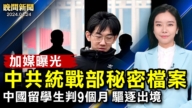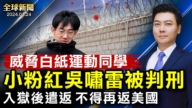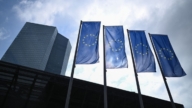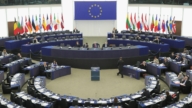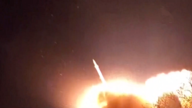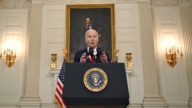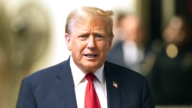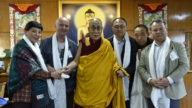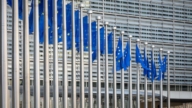【新唐人2015年01月07日讯】台美断交36年后,中华民国驻美代表处今年首度在双橡园举行元旦升旗典礼,此举引起中共当局的强烈不满。美国国务院表示,双橡园日前举行中华民国升旗典礼与美国政策不一致,但台美关系没有因此而改变。
2015年元旦,中华民国驻美代表处,于双橡园(Twin Oaks)举行升旗典礼,国旗由两位驻美海军军官护送入场。
中华民国驻美代表沈吕巡夫妇与代表处官员、侨务委员、侨界代表及退役将领等出席了仪式。
仪式由沈吕巡主持,并在双橡园主屋为军事代表团4位国军官员,颁授中华民国忠勤勋章,这也是军事代表团成员在台美断交后,首度正式穿国军制服出席双橡园仪式。
对此,中共向美国提出“严正交涉”。1月5号,中共外交部发言人华春莹说,中共“坚决反对”升旗仪式。
美国国务院发言人莎琪(Jen Psaki)回应指出,台湾在美升旗一事,不符合美国政策,美国事先对此并不知情,也没有任何美方官员出席仪式。不过她也强调,台美关系没有因此而改变。
台湾国立政治大学国际关系研究中心主任严震生:“双橡园有它的历史像征意义,在二次大战前就由中华民国取得了,所以到现在为止有一个延续性,这个我相信是北京方面不太愿意看到的。”
位于美国华盛顿特区的双橡园在1937到1978年,一直是中华民国驻美大使官邸。1978年时任美国总统卡特无预警宣布台美断交,双橡园在断交前夕,举行最后一次降旗仪式。睽违36年,中华民国国旗再度飘扬美国华府。
台湾国立政治大学国际关系研究中心主任严震生表示,现在的双橡园并非中华民国驻美代表的官邸,在这个地方举行中华民国的升旗典礼,从北京的角度来看,这其中有美国的默许。
台湾国立政治大学国际关系研究中心主任严震生:“在这个地方升起国旗,如果没有美国的默许,大概也不可能,所以中国大陆抗议的应该是为什么美国会默许的行为吧。当然,美国的默许会让中共政府很不高兴,但是这也是美国拿来制衡中国的一个手段。”
美国中文杂志《中国事务》总编辑伍凡:“台湾跟美国现在发生微妙的变化,我想跟中国大陆有关,中国大陆现在军事力量上来了,处处咄咄逼人,向外扩张,所以美国的政策就微调,还没到正式承认一个中华民国,但是让你把国旗升起来,表明一点意思就是跟你友好,下一步怎么走,还要看整个局势的变化。”
自从国民党部队1949年到台湾之后,中共和台湾一直分开统治。升旗仪式是最新一起涉及台湾、令中美关系紧张的事件。
中华民国驻美代表沈吕巡在升旗仪式发布的新闻稿中指出,忠爱自己国家的国旗是每个国家国民的神圣权利,也是普世人权的一部分,任何其他政治力量不应也不得打压。
虽然自2008年以来,台湾和中共已经签署一系列贸易和经济协议,但是双方政治和军事的怀疑仍然存在,特别是在推崇民主的台湾,许多人害怕中共的真实意图。
采访/朱智善 编辑/黄亿美 后制/郭敬
United States: ROC Flag-raising Doesn’t Mean Changes
in Taiwan-US Relations
ANCHOR:
36 years after Taiwan severed its diplomatic relations
with the U.S.,
Taiwan Representative Office in United States
(Taipei Economic and Cultural Representative Office, TECRO)
held its first national-flag-raising ceremony
at the Twin Oaks Estate on New Year’s Day.
It has aroused strong protest from the Chinese regime.
The US State Department said, “The ceremony is not consistent
with U.S. policy,"
and nothing has changed between Washington and Taipei.
On New Year’s Day 2015, the national flag was raised
at Twin Oaks.
The flag was escorted by two Taiwan naval officers
stationed in the United States.
Attending the ceremony were Taiwan’s Representative to the U.S.
Shen Lyu-shun and his wife, other TECRO officials,
board members of Taiwan’s Overseas Community Affairs Council,
representatives from the overseas Chinese community in the U.S.,
retired Taiwanese generals, etc.
Shen Lyu-shun presided over the flag-raising ceremony
and conferred upon four military personnel serving in the US
the Medal of Merit and the Order of Loyalty and Diligence
in the main hall of the Twin Oaks.
It was also the first time for military personnel
from Taiwan Military Mission to the US to attend a ceremony
at Twin Oaks Estate in military uniform
after the severance of diplomatic ties between the two countries.
In this regard, the Chinese regime lodged
“solemn representations" with the United States.
On January 5, Chinese Foreign Ministry spokeswoman
Hua Chunying said that the Chinese regime resolutely opposed
the flag-raising ceremony.
U.S. State Department spokeswoman Jen Psaki said
the ceremony “is not consistent with U.S. policy"
and that Washington did not know about it in advance.
She indicated that no U.S. officials attended the ceremony
and “nothing has changed as it relates to our relationship."
Yan Zhensheng, Director of the Research Center for Taiwan
International Relations of National Chengchi University:
“Twin Oaks Estate has its historical significance.
The Republic of China acquired it before World War II.
As it is symbolic of the continuity (of ROC),
I believe this is what Beijing doesn’t want to see."
Located in Washington, D.C., Twin Oaks Estate was
the residence of ROC ambassador to the U.S. from 1937 to 1978.
When the then US President Jimmy Carter abruptly announced
the severance of the ROC-US diplomatic ties in 1978.
The last flag-lowering ceremony was held at Twin Oaks
on the eve of the disconnection of the diplomatic relations.
Nearly 36 years later, the ROC flag was once again flying
in Washington D.C., the United States.
Yan Zhensheng expressed that now that the Twin Oaks
is no longer the residence of ROC ambassador to the U.S.,
from Beijing’s perspective, the U.S. might have given Taiwan
tacit consent to hold ROC flag-raising ceremony there,.
Yan Zhensheng: “Without U.S. consent, it’s not likely to hold
the flag-raising ceremony in that place.
So, the Chinese regime is protesting against the US act
of giving Taiwan tacit consent.
The Chinese regime, of course, would be unhappy
with the acquiescence,
but it’s also the US’s leverage over China."
Editor of American Chinese magazine China Affairs, Wu Fan:
“There have been subtle changes in the US-Taiwan relations
nowadays.
I think it has something to do with the Chinese regime.
Now that the Chinese regime is gaining more military prowess
and trying to expand its influence, the U.S. thus fine-tunes its policy.
Though it has not yet proceeded to the extent of formally
recognizing ROC, it allowed Taiwan to raise the national flag
to show its friendship.
As to the next step, it should be decided on the changes
of the overall situation."
Since the Kuomintang troops retreated to Taiwan in 1949,
China and Taiwan have been ruled separately.
The flag-raising ceremony was the latest Taiwan-related
incident that increased tension in Sino-US relations .
In the press release about the flag-raising ceremony,
Taiwan representative Shen Lyu-shun pointed out that
pledging allegiance to one’s own country’s national flag
is a sacred right of every national,
and it’s also part of universal human rights,
so it should not be suppressed by any other political forces.
Though Taiwan has signed a series of trade and economic
agreements with the Chinese regime since 2008,
there is still mistrust between the two sides
in the areas of politics and military.
In particular, many people in democratic Taiwan
are afraid of the Chinese regime’s motivations and intent
behind the scenes.
Interview/Zhu Zhishan Edit/Huang Yimei Post-Production/GuoJing


